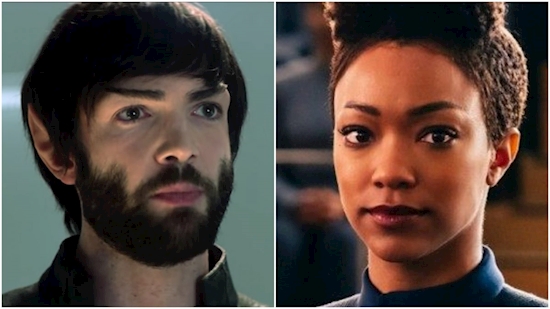I Hate This Theory About Michael and Spock on 'Star Trek: Discovery'
Over at Screenrant, John Orquiola has written an extensive theory that the schism between Michael Burnham and her adoptive brother Spock occurred because of a possible romantic past between the two. Can we not do this?
I’m not blaming Orquiola for voicing this theory—it is, quite frankly, a thought I had myself while watching the first episode of Star Trek: Discovery‘s second season, “Brother.” But the whole thing makes me exceedingly tired.
“Brother” takes pains to show that there was a deep well of complicated feelings between Spock and Michael, who joins Spock’s family as a child after her parents are killed. The young Spock is antagonistic to Michael upon her arrival, and present-day Michael tells their father Sarek that she hasn’t spoken to Spock in years.
She intimates that something went wrong in their relationship, but that there was a point when he accepted her “for a time.” I think we can assume there was a stretch of years where they overcame childish behavior and bonded, before something as-yet-to-be-revealed tore them apart.
The thought that a forbidden romance is the direction Discovery might be heading flashed through my head because media properties are frequently reductive in their treatment of how men and women interact. It’s hard not to consider that a drama known for loving twists might go for what they’d consider to be a shocking twist, as though none of us grew up reading V.C. Andrews.
Orquiola’s thesis on how what happened between them could be romantic in nature, and that Michael likely rejected Spock’s affection, leading to his retreat from her, feels both exhaustingly familiar and at the same time totally incompatible with Star Trek.
I’m no prude, but this isn’t Game of Thrones. It’s difficult for me to believe that Star Trek, a property that ultimately is there to further a utopian vision, would give Spock, the character who is the most revered in its canon, a retconned background of thwarted incestuous desire. Orquiola uses Spock’s known history to further posit that Spock had feelings for Michael, like Spock’s resistance to his betrothal to T’Pring in The Original Series. Orquiola writes:
I really, really, really hope that this does not prove to be the case. It’s not that the storyline’s concept bothers me so much—it’s the utter and complete lack of originality of it that I would find unbearable. Men and women are capable of being close without romantic ties and capable of fallouts that have nothing to do with romantic ties. Adoptive siblings being tormented by taboo emotions is neither an inventive idea in the history of narrative nor one that would fit with everything we know about Michael and Spock’s characters until now. It has no place on Star Trek: Discovery.
On Discovery, Michael implies that it’s her fault that she and Spock have fallen out. Orquiola writes, “Whatever did happen between Michael and Spock, Michael takes the blame for the relationship going sour, indicating she was the one who rejected Spock or ended what was going on. It’s even possible Michael broke Spock’s heart.” It’s frankly insulting that this theory postulates that Michael is the one who rejects Spock, then feels guilty about it. The burden is not on the person who rejects someone to be responsible for the other’s emotional state and its repercussions. We see this issue playing out in violent incidents in the real world every day. Hopefully whatever Michael did do in regards to Spock has zero to do with the theory.
No. No. No. If this season turns into a distorted Kirk/Spock Pon Farr fanfiction starring Michael I am throwing everyone out of the airlock.
I’m not touching this paragraph with a ten-foot pole.
Michael and Spock are both highly intelligent people who were no doubt competitive—for recognition of their gifts, for acceptance on Vulcan, for their parents’ affection, for success in Starfleet. A hundred thousand things could have occurred between them to cause conflict and fallout that have nothing to do with romance. This isn’t Game of Starships. Let’s not go here, guys.
(via Screenrant, image: CBS)
Want more stories like this? Become a subscriber and support the site!
—The Mary Sue has a strict comment policy that forbids, but is not limited to, personal insults toward anyone, hate speech, and trolling.—
Source: www.themarysue.com

